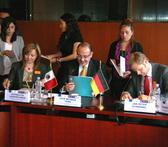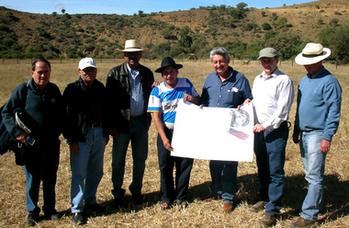Context
Climate change is having a serious impact on the Andean region – a situation that is further aggravated by the growing water shortage in the region, which is expected to have serious repercussions on soil fertility and local quality of life.
According to the Bolivian authorities, water is now so scarce that insufficiently treated or even untreated wastewater is being used in agriculture, a practice that fosters the spread of disease, especially diarrhoea, cholera and parasitic infestations.
Mexico and Germany have extensive experience in the areas of water resource management and wastewater treatment.
Wishing to harness this know-how, Bolivia asked Mexico and Germany to provide technical assistance in the fields of wastewater management and water pollution control. Having recently gained indepth experience through its water sector reform programme, Mexico is in a position to share its insights with Bolivia. The professional networks that Mexico has established are also of great use. Germany's vast technical experience and expertise, together with its long-standing partnership with Bolivia, provide a beneficial framework for triangular cooperation, enabling actors to build on networks and cooperation structures that are already in place. Bolivia, Mexico and Germany first engaged in triangular cooperation in 2011.
Objective
Sustainable cross-sector and participatory strategies for improving wastewater treatment are developed and implemented, thus helping to improve food security and contain the spread of diseases caused by contaminated water and agricultural produce.
Approach
Triangular cooperation between Mexico, Bolivia and Germany promotes the exchange of experience and the transfer of knowledge between experts from the three countries. Every year several study and research trips take place, as do joint seminars on various aspects of water resource management and wastewater recycling. This intensive cooperation and regular exchange of experience feeds and nurtures a dynamic knowledge platform that benefits all stakeholders. Key activity areas in the follow-on project include rolling out successful measures from the period 2011 to 2013, further developing wastewater standards and regulations, and organising more training for staff at national and municipal authorities by producing basic and further training modules (diplomado).
Various government agencies in the partner countries are involved. In Mexico, these are the National Water Commission (CONAGUA) and the Mexican Agency for International Cooperation and Development (AMEXCID). In Bolivia they are the Ministry of Development Planning (MPD) and the Ministry of Environment and Water (MMAyA). A large number of civil society organisations and research institutes are also involved in the project in Mexico and Germany.
Results
Through the creation of a dynamic learning platform, encouraging countries to exchange technical knowledge on a regular basis, Bolivia has been able to benefit from Mexico’s and Germany’s experience and know-how. In total, more than 220 experts and government agency staff have taken part in training workshops and seminars in Mexico and Bolivia on sustainable water resource management.

